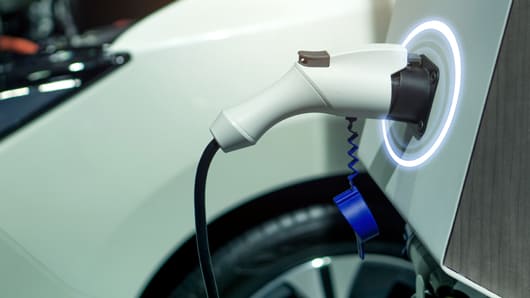Despite the rich oil reserves, the Gulf Cooperation Council (GCC) countries are showing significant progress in the electric vehicle (EV) market due to its focus on sustainability and reducing carbon emissions. Here are some key highlights of the GCC’s progress in the EV market.
The GCC region is witnessing heavy investments by automakers for electric vehicles, with OEMs offering electric vehicles in different segments ranging from hatchbacks like the Nissan Leaf to high-end sedans like the Tesla Model.
The GCC Electric Vehicle Market is expected to show an annual growth rate (CAGR) of 8.20%, resulting in a projected market volume of US$370.6 million by 2028. The unit sales of the Electric Vehicles market in the GCC are expected to reach 6,624 vehicles by 2028.
Here are the five prime countries making strides in the EV market.
- United Arab Emirates (UAE): With its significant efforts toward adopting green mobility solutions the country is expected to hold the largest share in the GCC electric vehicle market. About 50% of Dubai’s taxi fleet is already electric or hybrid vehicles, and the country further aims to convert the entire fleet to green vehicles by 2027 to making public transport emission-free by 2050. Dubai was also the first in the region to actively incentivise private EV ownership, by offering free charging for non-commercial EV owners through its network of more than 300 DEWA (Dubai Electricity and Water Authority) green chargers across the nation between 2017 and 2021.
- Saudi Arabia: Saudi Arabia led the GCC electric vehicle market in 2022. Saudi Arabia is also actively. promoting the adoption of EVs and unveiled its first zero-carbon city, The Line, at NEOM, in line with its Saudi Vision 2030 national development program, the country has an ambitious goal to manufacture 500,000 EVs a year by 2030. To this end, Saudi Arabia is investing in infrastructure to support EV manufacturing, including a steel-plate mill and a plant for battery metals for EVs as part of a $6 billion investment. Also, it is attracting global partnerships with firm like Hyundai, which has agreed to build a factory to assemble its vehicles in Saudi Arabia. There are also talks about Tesla setting up a manufacturing facility in the kingdom, and a $5.6 billion deal with Human Horizons, a Chinese firm that makes luxury EVs, for collaboration on development, manufacturing, and sales.
- Qatar: Qatar, too, plans to electrify its transport sector. The country’s Ministry of Transport aims to switch 35% of vehicles. in its fleet and 100% of its public transport buses to electric by 2030, and to deploy charging infrastructure and to promote EV-charging stations for personal use, as per reports. the EV market is still in its early stages in the region. with a need for streamlined regulatory frameworks, supply chain development and investment in necessary infrastructure. The Qatar Environment and Energy Research Institute (QEERI) has been conducting tests on commercial battery systems in Qatar’s extremely hot climate.to understand their degradation patterns and the impact of high dust levels on associated power electronics. As per reports, future research plans include assessing the performance, power consumption and battery degradation of EVs.
- .Kuwait: With the aim to attract foreign investments and reinforce Kuwait’s position as a financial and commercial hub, the Kuwait Port Authority (KPA) has approved the development of ‘EV City,’ which is planned to attract and cater to the needs of EV manufacturers. The completion of regulations for providing electric car chargers to customers and increasing the number of charging points, especially in government and commercial buildings, is a significant step towards expanding the EV market in Kuwait. Also, there is a noticeable trend of customers switching to electric cars, aligning with Kuwait Vision 2035 to promote the use of clean and renewable energy in the transportation sector.
- Bahrain: Bahrain’s Economic Vision 2030 has a target to diversify the economy away from oil & gas and adopt sustainable energy resources, which is expected to boost the EV market size in the coming years. The country is adapting to green transportation by developing the required EV infrastructure to meet the growing consumer requirements for EVs.
It may be noted that, in November 2021, Bahrain National Insurance introduced the first insurance policy specifically for electric vehicles, covering damage, fire, theft, battery, and charging cables.
EV Strategy Development: Bahrain has signed an agreement with a global advisory company to develop an EV strategy that will support the kingdom’s efforts to achieve carbon neutrality by 2060. Further, the country is focusing on developing strategies which will include the development of policies, regulations, and infrastructure required for charging electric vehicles. for streamlined regulatory frameworks, supply chain development and investment in necessary infrastructure, in addition to technological solutions for the region’s hot climate. The Qatar Environment and Energy Research Institute (QEERI) has been conducting tests on commercial battery systems in Qatar’s extremely hot climate to understand their degradation patterns and the impact of high dust levels on associated power electronics. Future research plans include assessing the performance, power consumption and battery degradation of EVs . Electrification of a jurisdiction’s vehicle fleet will curb significant emissions only if the electricity that drives these vehicles is produced from low-carbon energy sources, in particular renewable energy. This means that the transport sector’s electrification will only be sustainable in the long term if coupled to more renewable energy deployment in the region.


